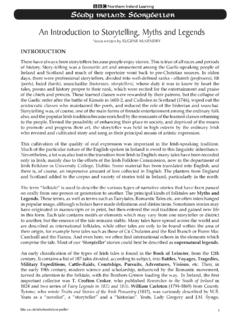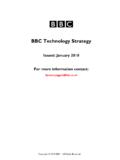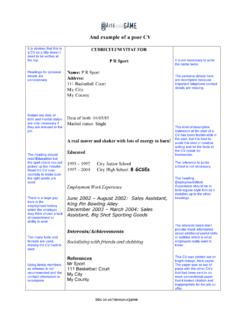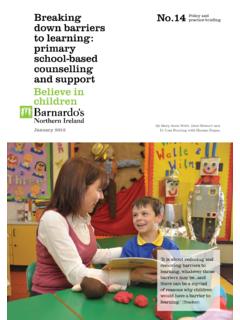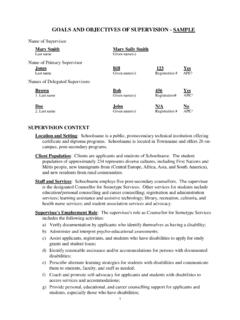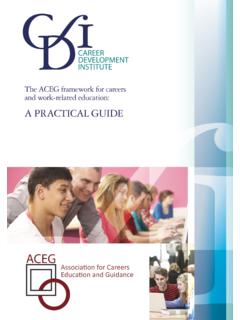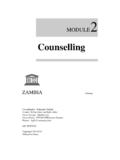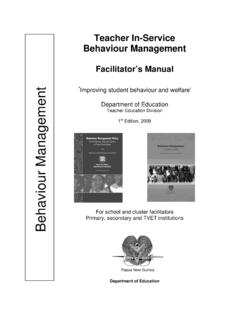Transcription of ESSENTIAL FOR ALL APPLICANTS - BBC - Home
1 1 ESSENTIAL FOR ALL APPLICANTS BBC Children in Need expects all grant applications to reflect these core principles Being focused on outcomes for children and young people Addressing disadvantage Safeguarding children Enabling participation by children and young people Avoiding statutory overlap or substitution Being focused on outcomes for children and young people We fund projects focused on differences made to the lives of disadvantaged children and young people. For this reason, APPLICANTS must provide clear evidence that disadvantaged children and young people: will be the primary beneficiaries of the project; and, will experience positive changes in their lives from the activities or services provided. Addressing disadvantage We expect projects to focus on addressing issues of disadvantage affecting children and young people.
2 We define disadvantage as: Illness, distress, abuse or neglect Any kind of disability Behavioural or psychological difficulties Living in poverty or situations of deprivation We expect that a clear majority of children to benefit from a grant are experiencing disadvantage. When applying you need to tell us about the children and young people your project is working with and describe how the disadvantages they experience affect their lives. It is also important for APPLICANTS to describe how they reach the disadvantaged children and young people who can benefit most from the project, especially as some of these may be harder to reach. Safeguarding (Working with Children) Organisations must provide evidence that they will protect children and young people while in their care and support them to develop.
3 You will need to demonstrate the following points within the application and during your assessment: 2 Your organisation has its own safeguarding and child protection policy and procedures, which everyone, including children and young people in your organisation knows about and uses in their day to day work. This should include having a named person responsible for child protection within your organisation. You undertake the appropriate checks for all staff, volunteers and management committee working directly with or with access to children and young people or information about children and young people. You ensure all staff, volunteers and management committee members receive working with children training which is relevant to their role and updated on a regular basis.
4 You take appropriate steps to ensure that children and young people in your care are safe, by conducting risk assessments for activities, by ensuring supervisory staff hold relevant qualifications, by providing adequate training to volunteers. All of these measures should help to make sure that the child or young person in your care will have a good experience when taking part in your project. Please be aware that your approach to safeguarding children will be explored further during assessment, should you reach this stage. Children and young people are at the centre of the work of BBC Children in Need and we believe that all children have the right to protection from harm. We recognise our responsibility to safeguard the welfare of all children and young people we work with, by a commitment to practice which protects them.
5 BBC Children in Need is not and cannot be expert in child protection but we work alongside the NSPCC, Safe Network and other leading organisations to promote best practice in safeguarding children and young people. Good child protection and safeguarding is achieved through establishing a positive organisational culture and a number of complementary procedures and checks. Please refer to the Safe Network website for safeguarding children in the voluntary and community sector, paying particular attention to the Are they safe? resource or the core safeguarding Standards . If you have any questions or require further guidance, you can contact the Safe Network enquiry service if you are in England or the NSPCC offers a Consultancy Service for organisations to access across the UK.
6 Enabling participation of children and young people in the project When making an application, you need to show: How you have taken children and young people's views into account about the work you plan to do and the differences in their lives you hope it will lead to How consultation and involvement will occur on an ongoing basis throughout the life of the project How children and young people who are involved in running or managing aspects of the project will be supported where appropriate. We know that there may be reasons why some projects may only offer limited consultation; however APPLICANTS will need to be able to clearly explain why this is the case. 3 Avoiding statutory overlap or substitution BBC Children in Need does not provide funding for the relief of statutory responsibilities.
7 We can consider applications for additional services that are clearly beyond statutory responsibility and organisations are expected to show that this is the case in their applications. We are unlikely to fund where a local authority or other statutory body has withdrawn or reduced funding to a project or service. For funding to occur in these circumstances there needs to be a very strong and distinctive case made by the applicant. A TO Z POLICIES AND GUIDANCE The following is an A to Z of policy and guidance information for APPLICANTS . We want to make sure that you don t waste time applying for things we don t fund. You will find valuable details on our expectations here - some are relevant to every project (for example safeguarding) and some are important for certain types of project (for example counselling projects or projects seeking funding for equipment).
8 Awareness Raising Buildings, Playgrounds, Sports Pitches etc Bursaries and Sponsored Places Charitable Incorporated Organisations (CIOs) & Scottish Charitable Incorporated Organisation (SCIO) Charity Registration Child Care (including Cr ches) Safeguarding (Working with Children) Churches Community Interest Companies (CICs) Computers and Internet Continuation Funding Counselling Projects Disability Early Years (including Children s Centres) Equipment Full Cost Recovery Governing Document or Constitution Holidays and Residentials 4 Homelessness Individual Children Legal Aid Local Authorities and NHS bodies Medical Aids and Equipment Mentoring and Befriending Projects Minibuses National Organisations Partnership Work Playgroups and Playschemes Pregnancy Project Costs Rare Medical Conditions Referees Religious Organisations Respite Care School-time Projects Schools School Exclusions Sessional Staff Support for Parents Staff Training Volunteer Expenses Women's Refuges Awareness Raising We do not consider applications for general awareness-raising or educational work about issues.
9 This refers to projects aimed at a general population of children or young people. Before we can consider awareness-raising projects they need to show that they are specifically targeted at children and young people who are already disadvantaged by the issue or at particular risk of being disadvantaged by it. (Examples might include awareness-raising focused on issues such as sexual abuse, domestic violence and alcohol or drug use, etc). Return to Index 5 Buildings, Playgrounds, Sports Pitches etc. We do not consider applications of more than 20,000 for any form of building work. This includes construction, renovation or conversion of new buildings, existing premises, playgrounds, sports pitches etc. We will only consider applications for building work of 20,000 or less where the amount requested from us will complete the total cost of the project enabling the building work to commence.
10 There are several key issues to be aware of when applying for a grant. Ownership: We will not consider applications to fund facilities where improvement adds to the capital value of statutory owned property, such as schools and hospitals. We will not consider applications to fund the development of a building and/or land that you do not securely own or lease. You should have a plan for meeting the future revenue costs of the building including repairs and maintenance. Planning: You must have planning permission for the work or permission under the lease. Accessibility and health and safety regulations must be considered in development. You must provide plans and estimates on request. Consultation: You must provide evidence of children and young people being involved in the design and development of the project.

